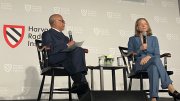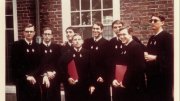At Friday afternoon’s rain-soaked Radcliffe Day celebration, Oscar-winning actress and filmmaker Jodie Foster received the 2025 Radcliffe Medal, reunited with an old college mentor, and gave a shout-out to Harvard for pushing back against the Trump administration. “What I hope for people now is that they take the gloves off, and Harvard has shown that recently, and right on,” Foster said, acknowledging that the politics of the last decade have left many people feeling “worn out and sad.” Then, looking toward the audience gathered in Radcliffe Yard, she added, “This group of thinkers in these rarified places, where the intellect and the ability to connect [are] really revered above all else, [need] to really understand that you have the power to use love as a guiding principle and be strategic.”
The day’s stated theme was women’s evolving role in film and television, but what kept coming up, for Foster as well as a panel of other speakers from the entertainment industry, were broader fights for equality and freedom. “Jodie has used the power of art to engage with existential questions that define the human experience,” said Radcliffe Institute Dean Tomiko Brown-Nagin in her introductory remarks, adding that Foster’s work focuses “our attention on critical issues and overlooked voices.” Long-distance swimmer Diana Nyad, who befriended Foster during the making of the 2023 movie Nyad about her historic solo swim from Cuba to Florida (in which Foster played Nyad’s trainer, Bonnie Stoll), described the actress as an “egalitarian” endearingly oblivious to her own charms and unpretentious about her talents. Now 62, Foster began acting in commercials at age three, and her breakout came in 1976 with Taxi Driver, filmed when she was 14. She’s won Academy Awards for The Accused (1988) and for her iconic role as Clarice Starling in Silence of the Lambs (1991). In 1991, she began directing films as well. Altogether, she has more than 100 acting and directing credits to her name.
On Friday, she sat down for a conversation with Fletcher University Professor Henry Louis Gates, Jr., and the two chatted like old friends. Which is what they are—Gates was Foster’s undergraduate adviser at Yale. She graduated magna cum laude in 1985. During their discussion, Foster spoke about mothers and motherhood, of growing up as a child actor and the family breadwinner, and of coming out as a lesbian. She also talked about what it was like to work in the male-dominated film industry of the 1970s and 1980s. “When I was growing up, I never saw another woman,” she said. Even the makeup artists were usually men. And so, it was men—surrogate “fathers and brothers,” she said—who taught her about the profession and later gave her opportunities that were still rarely available to other women. “A lifetime of very small microaggressions and having to bend myself [into] a pretzel in order to accommodate into spaces where normally I wouldn’t be welcome has allowed me to be a leader,” she said, “and the kind of leader that can really take 175 people on a crew and say, ‘We’re in this together.’”
Recalling Foster’s days at Yale, Gates brought up the academic interests they’d shared when she was a student and he was, as he put it, a “baby professor.” Foster majored in African American literature and, under Gates’s mentorship, wrote a senior essay on Toni Morrison’s Song of Solomon (1977). Gates even wrangled a hard-to-get audience for her with the legendary author, and Foster spent an afternoon at Morrison’s home near Nyack, New York. “Greatest moment of my life,” Foster said.
“So, first of all,” Gates said, repeating a question that Foster has been asked many times over the years, “why African American studies?” The answer, Foster replied, nodding again toward the listeners in Radcliffe Yard, “is really important for this audience to hear.” She chose her major, she said, because African American literature is a part of the American canon, and “because I am interested in literature that is as emotionally important as it is intellectually.” In fact, she argued, African American literature is perhaps the most American of all literary genres this country has produced. “For me, it is the shining light of literature.”
Gates also asked Foster about a traumatic experience she has rarely discussed publicly. In 1981, when she was a college freshman, she was stalked in New Haven by an obsessive fan, John Hinkley Jr., who later shot President Ronald Reagan in an attempt to impress her. During that period, Foster hired bodyguards and went into hiding—“I couldn’t live in my room,” she said—but remained on campus to continue acting in a student play. “It was a trial by fire,” she reflected. “I became an adult really quickly.” The experience led her to begin fiercely protecting her private life, something she has done ever since. “I looked at the kind of career that I wanted to have, and I really understood that I did not want to be famous, that I did not want to be a celebrity,” she said. “I needed to design a career in acting that was more than just being famous, because it was only worth it if I could do meaningful work.”
Before Foster and Gates took the stage, a panel of actresses, writers, and producers discussed women’s representation and recognition in the entertainment industry. “Though women have played essential roles in American film from the industry’s earliest days, they have nonetheless long been underrepresented,” said Brown-Nagin.
Stacy L. Smith, a communications professor at the University of Southern California, opened with some statistics. Only 13.4 percent of films last year were directed by women. But there were encouraging signs. 2024 marked the first time that over half of the top 100 films had a female lead or co-lead. And stories directed by women are more likely to be critically acclaimed today, Smith said.
Director Mira Nair ’79 shared three techniques that have helped her present diverse stories throughout her career. First is finding an audience whose stories are not being told. Her 1991 film, Mississippi Masala, depicts a romance between an Indian woman and an African American man. When it was released, that film attracted “lines around the block of hybrid couples,” she said, which made her realize that people found the story meaningful. Next, she recommended securing funding from several sources, rather than a single studio. Splitting the financing, she said, allows the director to retain more creative control. Third, she said that she tells “stories I think only I can make.” She continued, “If we don’t tell our stories, no one else will tell them. And if they tell them for you, they will tell them terribly.”
Filmmaker Naomi McDougall Jones said that the next five years will provide an unprecedented opportunity to improve diversity in filmmaking. Hollywood, she said, is “in a nuclear meltdown phase of its current model” because streaming is proving to be an unprofitable practice. She said that a disruptive new business model for filmmaking is on the horizon and wondered: Could it be designed with gender and racial parity at its core? “Films by and about women, and films by and about people of color make more money,” she said. Until that big disruption happens, Jones said incremental change is possible: she runs the 51 Fund, a private equity firm that finances movies by female filmmakers. She said the stakes are high. Films shape how people live their lives, she explained: “What stories we tell now, and who tells those stories, is going to determine the future of everything.”
Actress Amy Brenneman ’86 said that the narratives women seek are more complex than those often found in Hollywood films. Speaking of the women she knows, she noted, “The material they want is funny and smart and stupid and sexy and violent.” She drew professional inspiration from the Cornerstone Theater Company, which she co-founded while an undergraduate; the troupe traveled to small towns to stage productions alongside local residents. That experience broadened her horizons about who could act. She recalled working with an actor who did not know how to read but was able to memorize his lines from a tape recording instead. She also added that to improve women’s representation in films, better childcare is needed.
Executive producer Saladin K. Patterson spoke about the behind-the-scenes aspects of filmmaking: hiring writers and actors. He said that his best writers have some experience feeling like an outsider but managing to navigate the world nonetheless. “Hiring people who have diverse experiences and can talk on both sides of a situation only makes the creative content better,” he said. He also spoke about his 2021 revival of The Wonder Years, for which he cast actresses who “look how real women look.” He has a daughter, and “it was important for me for her not just to see herself,” he said, “but to see herself in that healthy way.” Patterson warned that the present moment is daunting for creatives, saying that studios are doing “less risk-taking when it comes to putting people of color and women behind the camera and on screen.” But it is also a moment of great opportunity. Young people, he said, can use their phones to “make creative content that it took me emptying out my savings account” to create.









